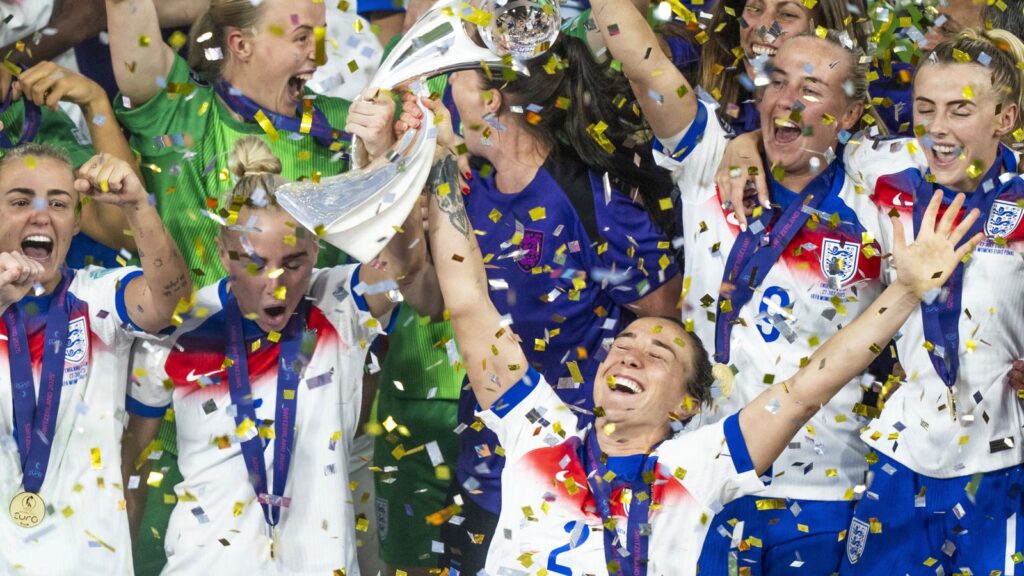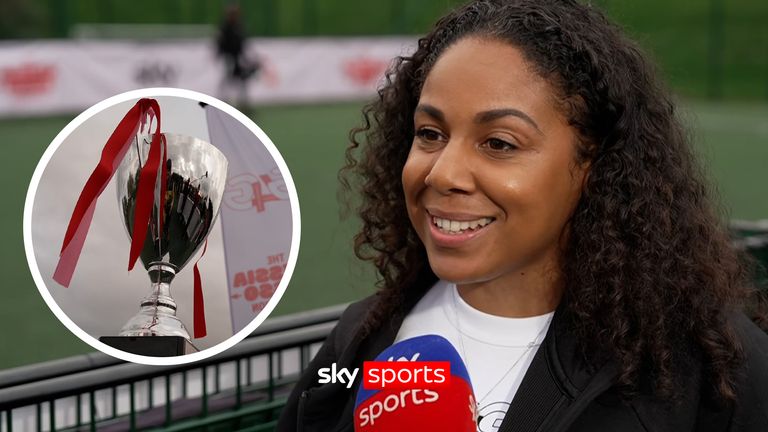The Football Association has met its objective for 90 per cent of schools to offer girls aged between seven and 14 equal access to football in PE three years early.
This milestone, originally set for 2028, was one of four strategic priorities set out by the FA in October 2024 as part of its new women’s and girls’ game strategy.
There are now 2.6 million girls in Key Stages 2 and 3 with equal access to football in PE – a 31 per cent increase since the 2020/21 season.
In that timeframe, the number of schools offering equal access to football through the curriculum across Key Stages 1-4 has risen from 63 to 79 per cent.
The Lionesses retaining their Euros crown over the summer has driven this cultural shift and sparked a surge in demand from girls wanting to play football, the FA said in a statement.
Since 2019, Barclays and the FA have worked together to deliver equal access for girls to play football in schools – in both curricular and extracurricular settings – through their Barclays Girls’ Football in Schools partnership.
The Barclays Girls’ Football in Schools network has increased by more than 500 per cent in the six years since it was formed and now reaches 90 per cent of eligible schools nationwide, expanding from 3,000 to 20,202.
“Today is a proper moment to celebrate,” said Ian Wright, Barclays football ambassador. “After the Euros I said if girls can’t play then what’s this all been for.
“This was never about girls becoming the next Lionesses, it was about normalizing girls playing football, just like boys do. It’s about equality. We set ourselves a big challenge, but we’ve reached it three years ahead of schedule.
“It’s down to The FA, to Barclays, all the brilliant schools and of course the girls, who only ever just wanted to play football.”
The FA hopes to build on meeting its curriculum target at Key Stage 2 and 3 by bringing the percentage of schools offering equal opportunities through extra-curricular clubs in those age groups from 83 to 90 per cent by 2028.
There is still work to be done at Key Stage 4, ages 14 to 16, where barriers such as confidence, body image and negative perceptions stop teenage girls participating in team sports.
Sixty-eight per cent of schools in the Barclays Girls’ Football in Schools programme provide equal opportunities for girls through extracurricular clubs – and the goal is to increase that to 75 per cent by 2028.
The FA’s head of development Stacey Mullock said: “No girl should ever face barriers to playing football in school. That belief drove us to set ambitious targets and push for a cultural shift where girls have the same access and opportunities as boys.
“Progress doesn’t mean the job is finished. There is still more to do – particularly in extra-curricular provision and at Key Stage 4 – to ensure every girl, at every stage, has equal access to the game.”
Tom Corbett, group head of sponsorship and client Experience at Barclays, added: “Reaching our target is a moment of real celebration and reflects how far we’ve come over the past seven years. But we’re not stopping here – there’s still more to do to make sure every girl, at every age, has the chance to enjoy the game we all love.”
Sky partners with Russo to remove barriers to participation
In November, Sky partnered with The Alessia Russo Foundation and Goals 4 Girls to launch The inaugural Alessia Cup, with a shared ambition to create lasting change by removing barriers to participation.
The tournament – which took place on November 6 – aims to build confidence, resilience, and leadership beyond the pitch, while highlighting the importance of keeping girls engaged in sport during adolescence.
The competition brought together 180 girls aged 12 to 14 from schools across north and east London at a crucial age when drop-off from sport participation is at its highest.
The tournament came after a Public First report, commissioned by Sky, found that playing sport as a child is shown to be as strong an indicator of women reaching senior positions as a university degree, yet girls aged 11-18 miss out on 280 million hours of sport annually compared to boys.
The Alessia Russo Foundation – launched in October 2025 – is dedicated to creating opportunities for girls and young women to play sport with pride, learn with purpose, and live with power.



